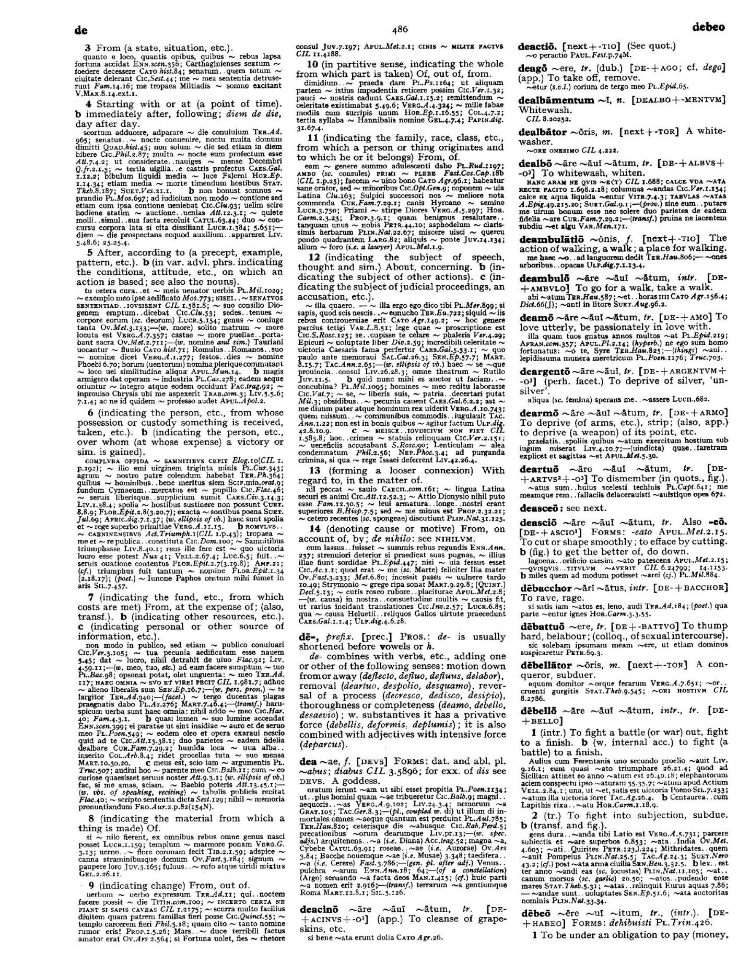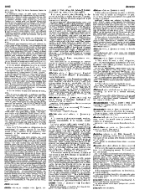
page_listing.tpl
page_subListingDetails.tpl
sub_listingDetails_style1.tpl
sub_listingDetails.title.tpl
dēbēre ought
dēbēre is a Latin Verb that primarily means ought.
Definitions for dēbēre
Wheelock's Latin
Verb
- 1
to owe
- 2
ought, must
English derivatives:
debt debit due duty
Oxford Latin Dictionary
Verb
- 1
To be under an obligation to pay (money, etc.), owe
- 2
(esp., leg.) To be under an obligation to give or provide.
- 3
To be bound to pay (by destiny or sim.)
- 4
To be indebted for, owe (to)
- 5
(w. inf.) To be under an obligation (to do something), (I) ought, should
Sentences with dēbēre
Latin to English
Dēbēs cо̄nservāre pecūniam tuam.Compare You ought to save your money.
Nōn dēbeō errāre.Compare I ought not to err.
Dēbent fīlium tuum laudāre.Compare They ought to praise your (sg.) son.
Lībertātis causā cīvitās nostra ab alterō virō gerī dēbet.Compare For the sake of liberty our state ought to be managed by the other man.
Modum tenēre dēbēmus.Compare We ought to maintain moderation.
Cum dēbēre carnufex cuiquam quidquam quemquam, quemque quisque conveniat, neget. (Ennius, fragment of a comedy) Compare Since the rascal denies that anyone owes anything to anyone, let each one sue the other.
Sine auctore vero propositi libelli nullo crimine locum habent debere. Nam et pessimi exempli, nec nostri saeculi est. (Traianus Plinio)Compare Information without the accuser's name subscribed must not be admitted in evidence against anyone, as it is introducing a very dangerous precedent, and by no mean agreeable to the spirit of the age. [Trajan to Pliny, on Christians]
Qui stadium curro, enitor debeo ut vinco.Compare He, who runs in the race, ought to strive to conquer.
Conjugation table for dēbēre
Cactus2000
| ACTIVE | |
| Indicative present | Indicative imperfect |
| dēbeō dēbēs dēbet dēbēmus dēbētis dēbent | dēbēbam dēbēbās dēbēbat dēbēbāmus dēbēbātis dēbēbant |
| Indicative perfect | Indicative pluperfect |
| dēbuī dēbuistī dēbuit dēbuimus dēbuistis dēbuērunt / dēbuēre | dēbueram dēbuerās dēbuerat dēbuerāmus dēbuerātis dēbuerant |
| Indicative future | Indicative future perfect |
| dēbēbō dēbēbis dēbēbit dēbēbimus dēbēbitis dēbēbunt | dēbuerō dēbueris dēbuerit dēbuerimus dēbueritis dēbuerint |
| Subjunctive present | Subjunctive imperfect |
| dēbeam dēbeās dēbeat dēbeāmus dēbeātis dēbeant | dēbērem dēbērēs dēbēret dēbērēmus dēbērētis dēbērent |
| Subjunctive perfect | Subjunctive pluperfect |
| dēbuerim dēbueris dēbuerit dēbuerimus dēbueritis dēbuerint | dēbuissem dēbuissēs dēbuisset dēbuissēmus dēbuissētis dēbuissent |
Infinitive present dēbēre Infinitive perfect dēbuisse Infinitive future dēbitūrum esse | Imperative present dēbē dēbēte Imperative future dēbētō dēbētō dēbētōte dēbentō |
| Indicative present | Indicative imperfect |
| - - dēbētur - - - | - - dēbēbātur - - - |
| Indicative perfect | Indicative pluperfect |
| - - dēbitus est - - - | - - dēbitus erat - - - |
| Indicative future | Indicative future perfect |
| - - dēbēbitur - - - | - - dēbitus erit - - - |
| Subjunctive present | Subjunctive imperfect |
| - - dēbeātur - - - | - - dēbērētur - - - |
| Subjunctive perfect | Subjunctive pluperfect |
| - - dēbitus sit - - - | - - dēbitus esset - - - |
Infinitive present dēbērī Infinitive perfect dēbitum esse Infinitive future dēbitum īrī | Imperative present - - Imperative future - dēbētō - - |
| PARTICIPLE | ||
| Participle present active | ||
| Nom. | dēbēns | dēbentēs |
| Gen. | dēbentis | dēbentium |
| Dat. | dēbentī | dēbentibus |
| Acc. | dēbentem | dēbentēs |
| Abl. | dēbente | dēbentibus |
| Participle future active | ||
| Nom. | dēbitūrus | dēbitūrī |
| Gen. | dēbitūrī | dēbitūrōrum |
| Dat. | dēbitūrō | dēbitūrīs |
| Acc. | dēbitūrum | dēbitūrōs |
| Abl. | dēbitūrō | dēbitūrīs |
| Participle perfect passive | ||
| Nom. | dēbitus | dēbitī |
| Gen. | dēbitī | dēbitōrum |
| Dat. | dēbitō | dēbitīs |
| Acc. | dēbitum | dēbitōs |
| Abl. | dēbitō | dēbitīs |
| Gerundive | ||
| Nom. | dēbendus | dēbendī |
| Gen. | dēbendī | dēbendōrum |
| Dat. | dēbendō | dēbendīs |
| Acc. | dēbendum | dēbendōs |
| Abl. | dēbendō | dēbendīs |
| Gerund | Supine | |
| Nom. | dēbēre | dēbitum |
| Gen. | dēbendī | dēbitū |
| Dat. | dēbendō | |
| Acc. | dēbendum | |
| Abl. | dēbendō | |
Data sources
Notes
- Definitions
- Frederick M. Wheelock, Wheelock's Latin, 6th ed., rev. Richard A. LaFleur (New York, NY: HarperCollins Publishers, 2005): 6.
- P. G. W. Glare, Oxford Latin Dictionary, Vols. 1-8 (Oxford: Clarendon Press, 1982): 486.
- Word frequencies
- Christopher Francese, "Latin Core Vocabulary," Dickinson College Commentaries, last modified 2014, http://dcc.dickinson.edu.
- Paul B. Diederich, The Frequency of Latin Words and Their Endings, PhD diss., (Columbia University, 1939).
- Louis Delatte, Suzanne Govaerts, Joseph Denooz, and Etienne Evrard, Dictionnaire fréquentiel et index inverse de la langue latine [Frequency Dictionary and Inverse Index of the Latin Language] (Liège, Belgium: Laboratoire d'analyse statistique des langues anciennes de l'Université de Liège [L.A.S.L.A.], 1981): 119.
Bibliography
Allen, Joseph H. Allen and Greenough's New Latin Grammar for Schools and Colleges: Founded on Comparative Grammar. Edited by James B. Greenough, George L. Kittredge, Albert A. Howard, and Benjamin L. D'Ooge. Boston, MA: Ginn & Company, 1903.
Crystal, David. A Dictionary of Linguistics and Phonetics. 6th ed. Oxford, UK: Blackwell Publishing, 2008.
Delatte, Louis, Suzanne Govaerts, Joseph Denooz, and Etienne Evrard. Dictionnaire fréquentiel et index inverse de la langue latine [Frequency Dictionary and Inverse Index of the Latin Language]. Liège, Belgium: Laboratoire d'analyse statistique des langues anciennes de l'Université de Liège (L.A.S.L.A.), 1981.
Diederich, Paul B. The Frequency of Latin Words and Their Endings. PhD diss., Columbia University, 1939.
Francese, Christopher. "Latin Core Vocabulary." Dickinson College Commentaries. Last modified 2014. http://dcc.dickinson.edu/latin-vocabulary-list.
Gildersleeve, Basil L., and Gonzales Lodge. Gildersleeve's Latin Grammar: Third Edition, Revised, and Enlarged. 3rd ed. London, England: Macmillan and Co., 1903.
Glare, Peter G.W. Oxford Latin Dictionary. Vols. 1-8. Oxford, England: Clarendon Press, 1982.
Krüger, Bernd. "Latin Conjugation Tables." Cactus2000. Accessed May 5, 2023. https://latin.cactus2000.de/index.en.php.
Pierson, Nick. "Sound of Text." Accessed October 26, 2019. https://soundoftext.com.
Wheelock, Frederick M. Wheelock's Latin. 6th ed. Revised by Richard A. LaFleur. New York, NY: HarperCollins Publishers, 2005.
Wiktionary Contributors. "Victionarium." Wikimedia Foundation, Inc. Updated March 18, 2019. https://la.wiktionary.org/wiki/Victionarium:Pagina_prima.
Citation
Chicago (17th ed.)
Allo Contributors. "dēbeō, dēbēre, dēbuī, dēbitum (v.) - Latin Word Definition." Allo Latin Dictionary. Last modified . Accessed February 19, 2026. http://ancientlanguages.org/latin/dictionary/debeo-debere-debui-debitum.
Entry created on . Last updated on .








